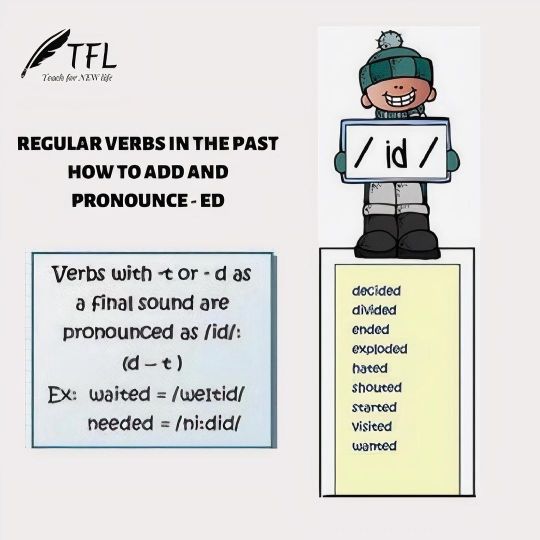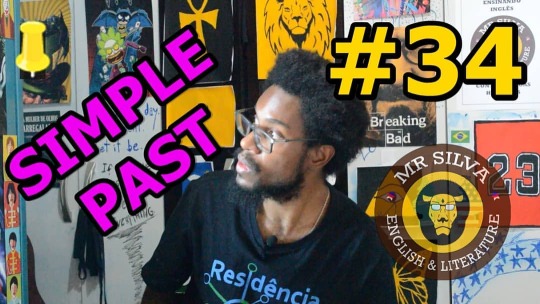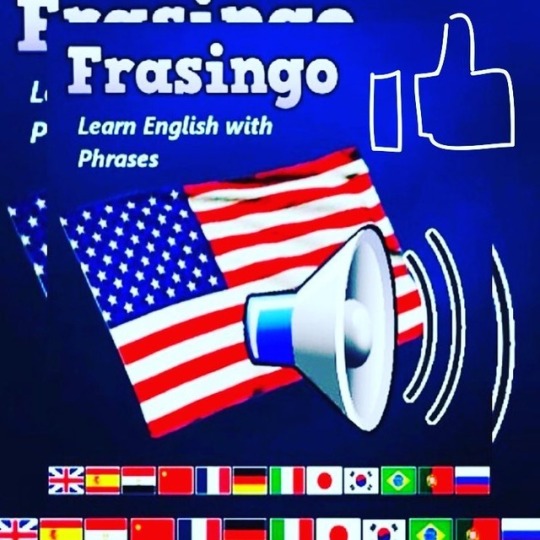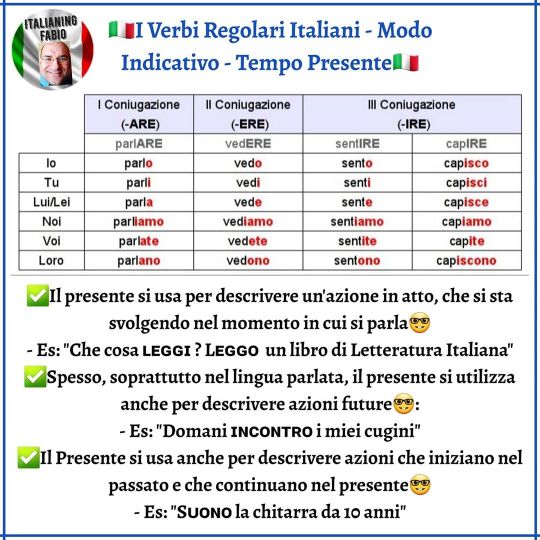#regularverbs
Explore tagged Tumblr posts
Text
0 notes
Photo

#pronounceenglish #regularverbs #inglesonline #aulasparticularesdeingles (em Poá) https://www.instagram.com/p/CN-YdyXJiyT/?igshid=150l0i56hsj5k
0 notes
Photo

What is the difference between irregular verbs and regular verbs? 🤔 #irregularverbs #regularverbs #inglesemcena #dicasdeingles #inglesonline #ingles #english #grammar #grammartips #englishtips https://www.instagram.com/p/CIDTtP6nsTt/?igshid=kzy91cr10ibi
#irregularverbs#regularverbs#inglesemcena#dicasdeingles#inglesonline#ingles#english#grammar#grammartips#englishtips
0 notes
Photo

🔛| . . . #simplepast #pastsimple #regularverbs #irregularverbs #grammar #esl #englishteaching #englishteacher #englishtips #mrjpsilva https://www.instagram.com/p/CElyOH0FFYI/?igshid=136v1rq4uwoq7
#simplepast#pastsimple#regularverbs#irregularverbs#grammar#esl#englishteaching#englishteacher#englishtips#mrjpsilva
0 notes
Photo

YOUTUBE CHANNEL AD MAIORA - SARA ALBANESE https://youtu.be/Sj56-vrhkNs 🇮🇹 Lesson in English for Italian learners 🌍 👉 The third conjugation of Italian Verbs (IRE) is explained and analyzed in this tutorial, starting from the two regular groups of verbs and then talking about a few common irregular verbs (finire, capire, pulire, spedire). 👍Special focus, as usual, on the pronunciation. ⚠️ See also: 👉LESSON 11 1st conjugation (ARE) https://youtu.be/8cAHW4yDCr4 👉LESSON 12 2nd conjugation (ERE) https://youtu.be/DTf5WjYdlLI #italian #italianverbs #italiangrammar #italianlesson #verbs #conjugation #thirdconjugation #ire #regularverbs #irregularverbs #italianforbeginners #italianforforeigners #youtube https://www.instagram.com/p/B8EVSkYCoMy/?igshid=egqei2zg7t6t
#italian#italianverbs#italiangrammar#italianlesson#verbs#conjugation#thirdconjugation#ire#regularverbs#irregularverbs#italianforbeginners#italianforforeigners#youtube
0 notes
Photo

Teaching Simple Past and asking your student to come up with a sentence using it. Result:... * I love teaching. ☺️ * #simplepast #mistaken #regularverbs #lkenglishclasses #skypeclass #learningenglish #learnenglish #studyingenglish #studyenglish #vocabulary #grammar #grammartips #ingles #easyenglish #englishteacher #englishtips #englishclass #englishlesson #englishstudents #english #ielts #toefl #toeic #englishgrammar #englishvocabulary #aprenderingles (em LK English Classes) https://www.instagram.com/p/BrkmkBRl1YN/?utm_source=ig_tumblr_share&igshid=vnkwobzl1myc
#simplepast#mistaken#regularverbs#lkenglishclasses#skypeclass#learningenglish#learnenglish#studyingenglish#studyenglish#vocabulary#grammar#grammartips#ingles#easyenglish#englishteacher#englishtips#englishclass#englishlesson#englishstudents#english#ielts#toefl#toeic#englishgrammar#englishvocabulary#aprenderingles
0 notes
Video
#anglictina #learn #english #tenses #pastsimple #tense #regularverbs . #anglictina #anglickecasy #anglictinasandy (na mieste Angličtina na Mieru) https://www.instagram.com/p/BoocwlOl2vG/?utm_source=ig_tumblr_share&igshid=cibiyyzx39uv
0 notes
Photo

#learnenglish#specialtimes#aprenderingles#Frasingo#appfrasingo#learnfrasingo#riskyrun#study#erasmus#phrasalverbs#irregularverbs#regularverbs#questionsanswered#InboundMarketing#socialmedia#marketing#academias#grupos
#socialmedia#irregularverbs#appfrasingo#regularverbs#inboundmarketing#erasmus#grupos#marketing#frasingo#questionsanswered#academias#specialtimes#aprenderingles#riskyrun#learnenglish#study#learnfrasingo#phrasalverbs
0 notes
Text
Commonalities Across RegularVerb Conjugation [24]
Okay, let’s review the essential points and get some new insight on conjugation:
(1) the infinitive (un-conjugated) form of every verb in Spanish ends in either -AR, -ER, or -IR.
In most cases, the verbs cannot be used in their infinitive form. This is because it alone doesn’t communicate enough information (as it pertains to a real situation). The verb comer tells us ‘to eat’ in a dictionary, but it doesn’t tell us who is eating in a café.
Some languages (like Japanese) permit the use of the infinitive to communicate the who, given a clear enough context. Spanish relies on context too, but not to the extent that a language like Japanese does. If you just said “comer” at the table, it is highly unlikely anyone would know you meant “Juan come” or “Yo como.” So, the verb is mostly conjugated. (I’ll give the exceptions later.)
(2) The verbs are all conjugated according to the subject pronouns. You remember these guys: yo, tú, él, ella, usted, nosotros, vosotros, ellos, ellas, ustedes. In short, these are all answers to who does the action.
(3) What’s cool about Spanish is that the who (the person doing the act) is often communicated by the conjugation itself. If you give me the phrase “comemos,” I actually can tell who is eating, for the simple reason that -emos is the ending that applies to nosotros. You don’t have to say nosotros; it can’t be anything else. (That being said, it helps if you’re trying emphasize: He is a fucking jerk.)
Moreover, as long as you are conjugating in any of the top four boxes (of the verb charts)—yo, tú, nosotros, vosotros—you never have to state the subject pronoun. “Comes” can only mean “you eat.” Just as “Bailo” can only mean “I dance.”
(4) You will notice that all the regular verbs, regardless of which group (-AR, -ER, -IR) conjugate with an -o in the Yo form. I like to think this is a simple symmetry: yo canto, yo mando, etc.
(5) There’s also the fact that all the tú forms end with an -s. (After their vowel that is.)
(6) The 3rd person singular forms—él, ella, usted*—all end with a vowel. (either -a or -e.)
(7) The nosotros forms all end with -mos. And they each keep the vowel from their infinitive forms. This is particularly important to remember for the -ER verbs to avoid confusion later on, when I teach you past tense!
(8) Finally, the 3rd person plurals—ellos, ellas, ustedes*—all end with -n. (After their respective vowels that is.)
So, why am I pointing all this out? So that you begin to see similarities even where there are supposed to be differences. This language needs to be looked at this way to make it seem (and be) more graspable. If you were to take all three verb group conjugation and lay them over one another (like transparency sheets) you would see that they actually all line up almost perfectly on their final letters: -o, -s, (okay, 2/3 on this one), -mos, -s, -n. In the case of vosotros, it’s not the same, but you know the final syllable will take an accent; even where they are not identical, they are still functionally similar.
Okay, that’s enough for now. Simple lesson: look for the patterns, even across the groups.
Over n Out.
*usted and ustedes are not 3rd person, but it saves space to put them into the same box as él and ella/ellos and ellas because they all share the same endings. (Because I may have never stated this: first person concerns the person talking—I am typing—second person concerns the person listening—you are reading—and third person concerns someone not involved in the communication act—that guy is crazy. So usted and ustedes are second person, but we draw them as part of the third person to save space and time. Wouldn’t you rather learn six conjugations than eight?)
1 note
·
View note
Text
Watch "Aprenda a pronunciar o ED definitivamente. para nâo errar mais.#regularverbs#ed#pronuncia" on YouTube
Watch “Aprenda a pronunciar o ED definitivamente. para nâo errar mais.#regularverbs#ed#pronuncia” on YouTube
View On WordPress
0 notes
Photo

Você sabe a diferença entre um VERBO IRREGULAR e um VERBO IRREGULAR em inglês? Não? Então confira essa dica! #irregularverbs #regularverbs #english #grammar #grammartips #english #inglesemcena #dicasdeingles #inglesonline #inglesnoinstagram https://www.instagram.com/p/CHJJWNInK1d/?igshid=1wn7ekg8ncjr0
#irregularverbs#regularverbs#english#grammar#grammartips#inglesemcena#dicasdeingles#inglesonline#inglesnoinstagram
0 notes
Video
Dica de ouro! Aula completa amanhã.| . . . #simplepast #pastsimple #regularverbs #irregularverbs #grammar #esl #englishteaching #englishteacher #englishtips #mrjpsilva https://www.instagram.com/p/CEkJXXPgVux/?igshid=12nnv41urggs5
#simplepast#pastsimple#regularverbs#irregularverbs#grammar#esl#englishteaching#englishteacher#englishtips#mrjpsilva
0 notes
Photo

🇮🇹Ciao!😀 Tutto chiaro sui verbi regolari, indicativo presente? Studia la struttura delle desinenze delle tre coniugazioni, e poi prova ad eseguire questo esercizio😉🤓👍⤵️ : 1) PARL-ARE: Susan e Paul _________ italiano 2) SUON-ARE: Noi_________ la chitarra tutti i giorni 3) CRED-ERE: _______ nelle favole? Non, non ci ______ 4) DORM-IRE: La domenica mattina _____ di più. 5) CAP-IRE:Puoi ripetere? Non________ cosa mi stai dicendo? ---- Buono studio e buon Italiano !🇮🇹 A presto, ciaoooo !!!!👋👍🇮🇹🇮🇹🎯 #italianingfabio #learnitalianwithfabio #fabiodemarco #italianlessons #italiancoach #italiantutor #italianconversation #ioparloitaliano #parliamoitaliano #lezionitaliano #italianoperstranieri #italianol2 #linguaitaliana #didatticaitaliano #insegnante #docente #italianteacher #verbo #verbi #italianverbs #ilverbo #verboitaliano #verbiregolari #regularverbs #indicativo #presente https://www.instagram.com/p/B-m2ynnnEfs/?igshid=18cavb15af48u
#italianingfabio#learnitalianwithfabio#fabiodemarco#italianlessons#italiancoach#italiantutor#italianconversation#ioparloitaliano#parliamoitaliano#lezionitaliano#italianoperstranieri#italianol2#linguaitaliana#didatticaitaliano#insegnante#docente#italianteacher#verbo#verbi#italianverbs#ilverbo#verboitaliano#verbiregolari#regularverbs#indicativo#presente
0 notes
Photo

Present Tense (yo) comparto • I share (tú) compartes • you (informal) share (usted) comparte • you (formal) share (él, ella) comparte • He/she/it shares (nosotros, nosotras) compartimos • we share (ustedes) comparten • you (plural) share (ellos, ellas) comparten • they share Oración • Sentence *Yo comparto con mi familia todos los fines de semana. I share with my family every weekend. . . . . . #aprendiendoespañol #learningspanish #presenttense #regularverb #toshare #sharing #compartir #compartiendo #children #kids #family #familia #flowers #minilessons #yohabloespañol #spanishtutor #spanishteacher #spanishstudent #multilingual #bilingual #polyglot
#children#kids#minilessons#family#yohabloespañol#spanishstudent#compartiendo#spanishtutor#learningspanish#aprendiendoespañol#flowers#compartir#multilingual#toshare#spanishteacher#polyglot#familia#sharing#regularverb#bilingual#presenttense
0 notes
Photo


Did we graduate the last month?
Answer: No, we didn’t.
Aleyda and Martha.
0 notes
Photo

Aprende portugués #portugues#loveportuguese#instalearn#dontgiveup #InboundMarketing #learnenglish#specialtimes#aprenderingles#Frasingo#appfrasingo#learnfrasingo#riskyrun#study#erasmus#phrasalverbs#irregularverbs#regularverbs#questionsanswered#london#usa#miami#texas#elpaso
#miami#specialtimes#study#aprenderingles#appfrasingo#learnfrasingo#riskyrun#usa#irregularverbs#portugues#instalearn#learnenglish#regularverbs#loveportuguese#dontgiveup#questionsanswered#elpaso#inboundmarketing#frasingo#erasmus#phrasalverbs#london#texas
0 notes